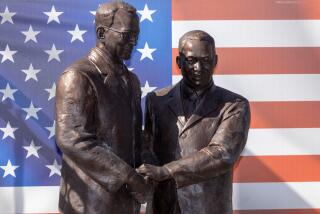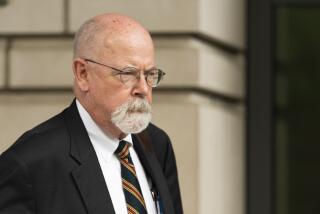79-Year-Old Attorney Still Jousts for Fairness at the Hall of Justice
- Share via
At 79, Harrison M. Dunham is almost certainly the oldest practicing attorney in Ventura County.
But you won’t see him around the Hall of Justice this week.
Dunham and his “lady friend,” as he calls his longtime companion, will be on a paddle-wheel steamboat, chugging up the Ohio River on their way to Saturday’s Kentucky Derby.
“I finally got tickets after trying for three years,” Dunham said last week.
Seeing the Derby is one of the few things that Dunham hasn’t experienced since he graduated near the top of his class at Harvard Law School 56 years ago. Aside from handling thousands of legal matters--including more than 40 murder trials--Dunham has operated a cannery, flirted with politics, managed a television station and turned down a judgeship.
He has known mobsters and movie stars, presidential candidates and candidates for the gas chamber. Along the way, he reared three children and made and lost a fortune.
Since coming to Ventura County 26 years ago, he has become a revered figure at the Hall of Justice, where he spends every weekday morning handling criminal matters.
“Harrison is a wonderful man,” said attorney Richard C. Loy, who has seen Dunham in action countless times. “He’s still in there, fighting for fairness. When I get down and frustrated, I look at Harrison and say, ‘Hey, here’s a guy who’s been doing this for 50 years.’ ”
Since his retirement from the public defender’s office 10 years ago, most of Dunham’s work has come through Conflict Defense Associates, a group of private attorneys who handle indigent cases. Dunham typically fills in for CDA attorneys during arraignments, bail reviews and other brief proceedings.
But Dunham also has a small practice of his own, based in a tiny second-floor office in the same downtown Ventura building where “Perry Mason” creator Erle Stanley Gardner practiced in the 1930s. Dunham said he often works for free.
“It’s almost all pro bono work,” he said. “A lot of attorneys have so much more overhead than I have.”
Steven Z. Perren, presiding judge of the Ventura County Superior Court, recalled an incident in the early 1970s, when he was a deputy district attorney prosecuting a young woman in a traffic case.
Representing herself, the woman was struggling to cross-examine the officer who had ticketed her. “She was helpless, immobilized,” Perren said. “She clearly had so much she wanted to point out, but she just could not do it.
“Harrison stood up out of the clear blue and said, ‘May it please the court, may I volunteer to step in?’
“In the next 20 minutes he did some of the most brilliant cross-examination I have ever seen,” Perren said. “He did a marvelous job. I thought, ‘Golly, that’s pretty neat.’ ”
But Dunham’s critics--all of whom insisted on anonymity--fault him for being abrupt with clients, sometimes telling them to sit down and shut up when they want to ask a question. “He doesn’t treat his clients with much dignity,” one attorney said.
Loy said such criticism misses the point. “If clients want hand-holding, they should get some inexperienced hand-holder,” he said. “If they want the most efficient and best work possible from an experienced, wise man, they should use Harrison.”
Dist. Atty. Michael D. Bradbury said Dunham “serves his clients very well. He’s very effective.
“Harrison didn’t ask me very often for anything special,” Bradbury said, “but when he did, I knew that it was sincere and just. When Harrison comes to you, you listen.”
Superior Court Judge James M. McNally said Dunham “knows very intuitively what a case is worth.”
Perren agreed. “He has a good feel for the right result,” he said. “He’ll look at you in a grandfatherly way and say, ‘Come on, judge, don’t do that.’ There’s a certain wisdom inherent in his years that you can’t ignore.”
Whatever people say about him, Dunham has no plans to take down his shingle.
“I just like being alive and doing it, that’s all,” Dunham said.
His neighbor and longtime companion, Esther Edwards, said Dunham thrives on his work. “If they took that job away, you might as well say goodby to him,” she said. “It’s his life.”
It was probably inevitable that Harrison Monroe Dunham would become an attorney. His grandfather was a Michigan Supreme Court justice, and his father was a prominent criminal attorney in Grand Rapids, where Dunham was born in 1913. His very name sounds like a law firm.
But the law was not Dunham’s first choice as a career. He wanted to be an architect and was studying engineering at UCLA when his father died in 1931. In his will, the elder Dunham decreed that his son was to get nothing unless he went to law school.
It was the middle of the Depression; Dunham went to law school.
And as it turned out, he said, “I loved it.”
While at Harvard, he met Bronson Cutting, a senator from New Mexico. Cutting took an interest in the young law student and promised to groom him for a political career.
But shortly after Dunham obtained his law degree and passed the New Mexico bar, Cutting was killed in a plane crash. It was the first of several jinxed experiences in politics for Dunham, who would later lose a race for the state Assembly and take part in the ill-fated 1948 presidential campaign of Thomas E. Dewey in California.
After Cutting died, Dunham returned to Los Angeles with his new wife, Betty Carroll Dunham, and joined the firm of Gibson Dunn & Crutcher, now one of the nation’s largest.
Among his cases was that of Antonio Bennati, a onetime Chicago mobster who had built an ultra-modern cannery near Fresno. The problem was that Bennati had used his mob connections to obtain stainless-steel equipment, which was strictly controlled by the government during those prewar years.
“He told me, ‘If you get me out of prison, I’ll give you the cannery,’ ” Dunham said. The attorney flew to Washington, made a deal to get Bennati paroled and inherited the cannery when the mobster died a few months later.
World War II had begun, and the government couldn’t get enough canned food for the troops. “It was a gold mine,” said Dunham, who moved his family to Fresno during the wartime boom. “We couldn’t produce too much. It grew like Topsy.”
But the war’s demands turned against Dunham a few years later, after he and a few other investors had poured millions into the fledgling frozen-food business. For a while, he said, “It went beautifully. We were sending carloads of frozen food out of Watsonville.”
Then the fighting in Europe ended, and the war effort was focused on the Pacific. The government took over all frozen-food storage facilities in the West for military uses.
“We had no place to put it,” Dunham said. “That’s what broke us. We lost several million dollars in less than 30 days.”
One of his partners killed himself. Dunham liquidated his food-related holdings and went back to Los Angeles to find a job.
Ed Carter, a UCLA classmate who then headed The Broadway department store chain, helped Dunham land a job as a corporate counsel for the Los Angeles Times. In 1950, when The Times opened Los Angeles’ second television station, KTTV, Dunham was named general manager.
A few years later, when the station was sold, Dunham returned to private practice and handled a number of murder cases. One of his clients was Clyde Bates, who was sentenced to death for starting a nightclub fire that killed six people. The sentence was later commuted to life in prison.
During the 1950s, Gov. Goodwin J. Knight--Dunham’s former law partner--offered him a judgeship, but he declined. Dunham said he was making too much money as a private attorney.
But in 1966, Dunham had to give up practicing in Los Angeles when his wife developed a serious heart ailment. “They said I had to get her away from the smog,” he said.
Betty Dunham fell in love with city of Ventura. And an old friend, Richard E. Erwin, had just been hired as the first public defender in Ventura County. He asked Dunham to be his top assistant.
“I wanted to get some experienced people to train the others,” said Erwin, who is retired and lives in Carpinteria.
Among those Dunham trained was James Matthew Farley, who is now Dunham’s boss at CDA. “Harrison taught me more about the practice of law in three months than I had learned in law school and in two years out on my own.”
Farley said Dunham is “undoubtedly the oldest practicing attorney in Ventura County,” but said he can stay with CDA as long as he wants.
“He has forgotten more law than 99% of the Ventura County criminal defense bar--combined--knows,” Farley said.
Dunham still lives in the Ventura hillside apartment where he and Betty settled 26 years ago. Like his wife, who died in 1977, Dunham loves to paint, and his watercolors hang in several offices at the Hall of Justice.
He also loves to dance. Last week, as he prepared for his riverboat trip, he said he had to stop by his doctor’s office.
“I’m getting two cortisone shots in my knee so I can dance on the cruise,” he said.
More to Read
Sign up for Essential California
The most important California stories and recommendations in your inbox every morning.
You may occasionally receive promotional content from the Los Angeles Times.










